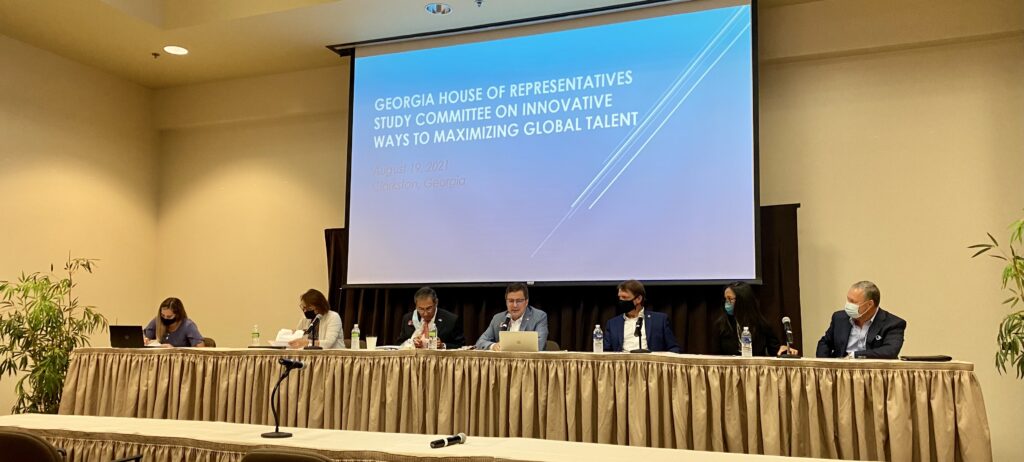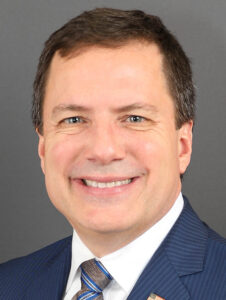
Study Committee on Innovative Ways to Maximize Global Talent (including foreign cops) excludes pro-American worker voices
“Foreign-born” depicted as victims of over regulation in Georgia economy
Readers who would oppose state legislation to allow foreign nationals to be certified law enforcement officers in Georgia may want to prepare their resistance. It’s a goal of one participant in last week’s meeting of the ‘House Study Committee on Innovative Ways to Maximize Global Talent.’
Many thanks to Insider Advantage Georgia for last week’s news report (pay wall) educating readers on the existence of this committee and the Clarkston – located meeting.
Chairman Rep Wes Cantrell (R) – Woodstock) outlined his committee’s purpose at the August 19 meeting “…this committee has been formed to identify and make recommendations for removal of any barriers that limit the impact of our foreign-born population.” He made it clear input from the corporate-funded “expert” witnesses had been solicited.

The speakers offered repeated attempts to blur any distinction in context between “foreign-born” and residents who are foreign nationals. Most Georgians, including this one, don’t have a problem with naturalized Americans becoming law enforcement officers. But that’s not what the activist from Business & Immigration for Georgia Darlene C. Lynch was selling.
“We have outdated barriers and regulations that are preventing people from contributing to the economy. Foreign-born people who worked with the U.S. military in Afghanistan in the military security system who can’t be police officers in their own community in Georgia because we have restrictive regulations in Georgia” was part of Lynch’s presentation.
What is the “restrictive regulation?” Police officers in Georgia must be U.S. citizens.
There were many references to “barriers” for “foreign-born Georgians”, but little detail on exactly what barriers are in place keeping any legally present individual from full participation in the Georgia economy. We won’t be surprised to see an expansion of the agenda. Will the state E-Verify laws requiring verification of work eligibility for newly hired employees come up as an “outdated barrier” in a future meeting? We’ll see.
There was no opportunity for public input beyond the pre-arranged witnesses. There should be.
This pro-enforcement writer is a long-time, reluctant denizen of the Gold Dome who has assisted lawmakers with legislation aimed at discouraging illegal immigration by deterring access to illegal employment and illegal access to public benefits. After attending last Tuesday’s event I asked for the opportunity to provide more realistic input in either of the two upcoming committee meetings. That request was quickly denied.
It may be true that the first 236 names in the Hahira phone directory have at least as much knowledge on immigration as most Georgia legislators. So the day’s entry-level lesson for the committee had a segment on “key terms.”
Legislators were told that an “immigrant” is “a person who has left their country of nationality to live permanently in a new country.” This is true in a dictionary, but not in practice. Managing language and the endless effort to blur any line between legal immigrants and illegal aliens is the bedrock of the open border lobbying effort. Georgia is home to more illegal aliens than green card holders.
Real immigrants do not require amnesty
The mindset presented to the attentive committee is that the million-plus illegal aliens who have already crossed our southern border this year are merely “immigrants.” And the foreign-born who routinely enter the U.S. on legal, non-immigrant, temporary visas and become illegal aliens when they refuse to leave are as worthy of accommodation as the million foreign-born we naturalize every year. Fact: For the seventh consecutive year, in 2019 visa overstays exceeded illegal border crossings (NPR).
Not all committee members are elected officials
The committee on eliminating “barriers” has two non-legislator members who will effect the coming recommendations for any legislation.
Legislators are Wes Cantrell (R), Woodstock (Chair), Kasey Carpenter (R), Dalton, Mike Cheokas (R), Americus, Angelika Kausche, (D), Johns Creek and Spencer Frye, (D), Athens. Carpenter was absent.
Also Shushma Barakoti from the Refugee Women’s Network and Rene Diaz, CEO of Diaz Foods. Diaz is a past Atlanta Business Chronicle ‘Top 100 Most Influential Atlantans.’ He and his wife Barbara are a “Buckhead Power Couple.” Diaz is also Founding Friend of the well-known anti-enforcement, immigration lobbying group GALEO Inc.
One of the witnesses on a panel discussion was an illegal alien DACA recipient, Jaime Rangel – who is a lobbyist under the Gold Dome for Mark Zuckerburg’s pro-amnesty FWDus.

For this writer, the most irrelevant, eye-rolling remarks of the day came from state Rep Spencer Frye as he introduced himself to the room. “Unless anybody in here is full-blooded American Indian, I reckon we’re all immigrants of some sort.” Frye did not speculate on from where the Indians migrated. But he did follow with “while I look like I look, I am absolutely descended from immigrants to the United States of America.”
Official House video of the committee meeting here. Photos here. Program and players here. The next meeting is at Dalton State College, September 9th and a final meeting in the state Capitol in early October.
A version of this column originally appeared (August 25, 2021) on the subscription outlet Insider Advantage Georgia as an OPED.

